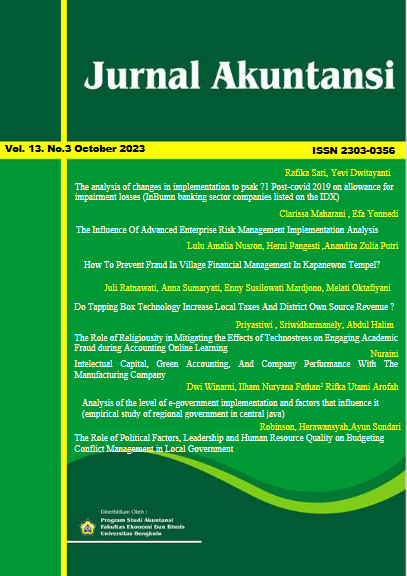Main Article Content
Abstract
The new public management is an attempt by the government to improve public accountability, transparency, and more effective and efficient performance. The application of e-Government is an innovation by local governments to realize the achievement of new public management. Not only has the aim of transparency and accountability, the use of the e-Government application system is also expected to be able to improve the performance of local governments with the principle of value for money. The purpose of this study is to analyze the factors that influence the implementation of e-Government in the Regional Government of Central Java and the relationship of each of these factors to the implementation of e-Government. The research was conducted using quantitative research methods with data analysis using EViews. The results show that local revenue (PAD) has a positive effect on the level of implementation of e-Government, spending capital has no effect on e-Government implementation, local government financing has a positive effect on e-Government implementation, regional per capita income (PDRB) has no effect on implementation e-Government, the level of public education has no effect on e-Government, and the population has no effect on the implementation of e-Government.
Article Details
Copyright (c) 2023 Dwi Winarni, Ilham Nuryana Fathan, Rifka Utami Arofah

This work is licensed under a Creative Commons Attribution-ShareAlike 4.0 International License.
Author retains the copyright and grants the journal the right of first publication of the work simultaneously licensed under the Creative Commons Attribution-ShareAlike 4.0 License that allows others to share the work with an acknowledgement of the work's authorship and initial publication in this journal
Author is able to enter into separate, additional contractual arrangements for the non-exclusive distribution of the journal's published version of the work (e.g., post it to an institutional repository or publish it in a book) with the acknowledgement of its initial publication in this journal.
Author is permitted and encouraged to post his/her work online (e.g., in institutional repositories or on their website) prior to and during the submission process, as it can lead to productive exchanges, as well as earlier and greater citation of the published work (See The Effect of Open Access).
Creative Commons Attribution-ShareAlike (CC BY-SA)
Jurnal Akuntansi is licensed under a Creative Commons Attribution-ShareAlike 4.0 International License.

